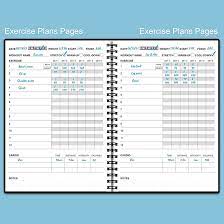The Benefits of Keeping a Workout Log
Keeping a workout log is a simple yet powerful tool that can greatly enhance your fitness journey. Whether you’re a seasoned athlete or just starting out, tracking your workouts can provide numerous benefits that contribute to your overall progress and success.
Accountability and Motivation
By recording your workouts in a log, you hold yourself accountable to your fitness goals. Seeing your progress laid out in front of you can be incredibly motivating and help you stay on track, especially on days when you may feel less motivated.
Progress Tracking
A workout log allows you to track your progress over time. You can see how much weight you’ve lifted, how many reps you’ve completed, or how long you’ve run, enabling you to set realistic goals and push yourself to improve gradually.
Identifying Patterns and Adjustments
By reviewing your workout log regularly, you may identify patterns in your training that can help you make adjustments for better results. You can pinpoint what works well for you and what areas may need improvement, leading to more effective workouts.
Improved Performance
Consistently tracking your workouts allows you to analyze trends in your performance and make informed decisions about adjusting your training program. This data-driven approach can lead to improved strength, endurance, and overall fitness levels.
Celebrating Achievements
Keeping a workout log gives you the opportunity to celebrate your achievements, no matter how big or small they may be. It serves as a visual representation of your hard work and dedication, boosting your confidence and reinforcing positive habits.
Conclusion
In conclusion, maintaining a workout log is a valuable practice that can enhance every aspect of your fitness journey. From providing accountability and motivation to facilitating progress tracking and performance improvements, the benefits of keeping a workout log are undeniable. Start logging your workouts today and experience the positive impact it can have on your overall health and well-being.
Top 8 Frequently Asked Questions About Workout Logs
- What is a workout log?
- Why should I keep a workout log?
- How do I start a workout log?
- What information should I include in my workout log?
- How often should I update my workout log?
- Can I use an app to keep track of my workouts?
- Should I review my past workouts in the log?
- Is it beneficial to share my workout log with a personal trainer?
What is a workout log?
A workout log is a valuable tool used to track and record details of your exercise sessions and physical activities. It typically includes information such as the type of workout performed, the duration, sets and repetitions completed, weights lifted, cardio activities, and any notes or observations about the session. By keeping a workout log, individuals can monitor their progress, stay accountable to their fitness goals, identify patterns in their training, make informed adjustments to their routines, and ultimately optimize their performance and results. It serves as a comprehensive record of one’s fitness journey and can be a powerful motivator in achieving personal health and wellness objectives.
Why should I keep a workout log?
Keeping a workout log is essential for several reasons. Firstly, it provides accountability and motivation by holding you responsible for your fitness goals and progress. Secondly, a workout log allows you to track your performance over time, enabling you to set realistic goals and make informed adjustments to your training program. Additionally, by identifying patterns in your workouts, you can optimize your routines for better results. Ultimately, maintaining a workout log helps you stay focused, track your achievements, and continuously improve your overall fitness journey.
How do I start a workout log?
To start a workout log, begin by setting clear goals for your fitness journey. Determine what you want to achieve, whether it’s building strength, improving endurance, losing weight, or enhancing overall health. Next, choose a format for your workout log that works best for you, whether it’s a physical notebook, a smartphone app, or an online spreadsheet. Include key details in your log such as the exercises performed, sets and reps completed, weights lifted, duration of cardio sessions, and any notes on how you felt during the workout. Consistency is key when keeping a workout log; make it a habit to record your workouts immediately after completing them to ensure accuracy and effectiveness in tracking your progress over time.
What information should I include in my workout log?
When it comes to maintaining a workout log, it’s essential to include key information that can help you track your progress effectively. Some important details to include in your workout log are the date of the workout, the type of exercise or activity performed, the duration of the workout, the sets and repetitions completed, the weight lifted or resistance level used, any notes on how you felt during the workout, and any modifications or adjustments made to your routine. By including these details in your workout log, you can create a comprehensive record of your fitness journey and make informed decisions about your training program for optimal results.
How often should I update my workout log?
When it comes to updating your workout log, consistency is key. Ideally, you should update your workout log immediately after each workout session while the details are fresh in your mind. This practice ensures that you accurately record important information such as the exercises performed, sets and reps completed, weights lifted, and any notes on how you felt during the workout. Regularly updating your workout log allows you to track your progress effectively, identify trends in your training, make necessary adjustments, and stay motivated on your fitness journey. Remember, the more diligently you maintain your workout log, the more valuable insights you can gain from it to optimize your workouts and achieve your fitness goals.
Can I use an app to keep track of my workouts?
Using an app to keep track of your workouts is a convenient and effective way to monitor your fitness progress. There are numerous workout tracking apps available that offer features such as exercise logging, progress tracking, goal setting, and personalized workout plans. These apps make it easy to record your workouts, track your performance metrics, and stay organized with your fitness routine. Additionally, many workout apps provide insights and analysis based on your data, helping you make informed decisions about your training regimen. Whether you’re a beginner or a seasoned athlete, utilizing a workout app can streamline the process of maintaining a detailed workout log and ultimately support you in achieving your fitness goals.
Should I review my past workouts in the log?
Reviewing your past workouts in the log is a highly recommended practice for anyone serious about their fitness journey. By examining your previous training sessions, you can gain valuable insights into your progress, identify patterns in your performance, and track your improvements over time. This reflection allows you to make informed decisions about adjusting your workout routine, setting realistic goals, and pushing yourself to new heights. Regularly reviewing your past workouts not only helps you stay accountable but also serves as a source of motivation as you witness the tangible results of your hard work and dedication.
Is it beneficial to share my workout log with a personal trainer?
Sharing your workout log with a personal trainer can be highly beneficial for maximizing the effectiveness of your fitness regimen. A personal trainer can provide valuable insights and expertise by analyzing your workout log to tailor a customized training plan that aligns with your goals and capabilities. They can identify areas for improvement, track your progress more accurately, and make necessary adjustments to optimize your workouts for better results. Additionally, sharing your workout log with a personal trainer fosters accountability and motivation, as they can offer guidance, support, and encouragement throughout your fitness journey. Ultimately, collaborating with a personal trainer using your workout log as a guide can lead to enhanced performance, accelerated progress, and overall success in achieving your fitness goals.




Wow! Finally I got a website freom whhere I bbe ablle too in fact obtain helpful
informatiopn reyarding my study annd knowledge.
Thank you for your comment! We’re glad to hear that you found the information on workout logs helpful for your studies and knowledge. If you have any questions or need further clarification, feel free to ask. Keep up the great work with your fitness journey!